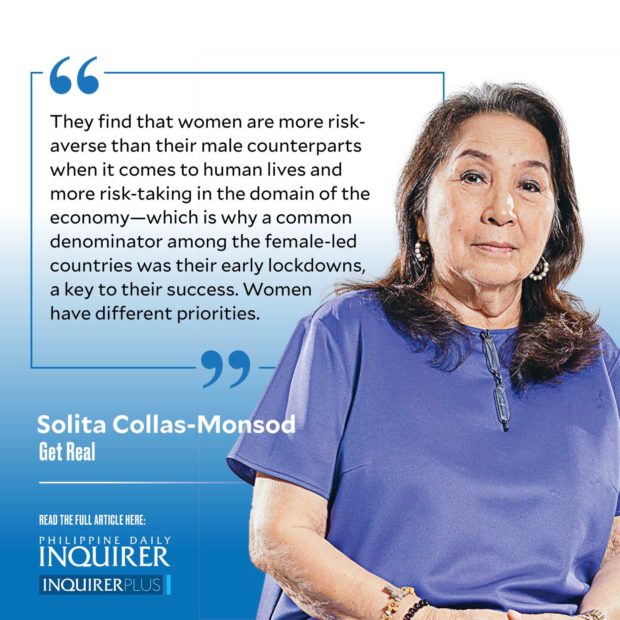Women-led countries do better against COVID-19
“Women should be in politics.” Is that (1) a ho-hum statement that one makes to be politically correct, to show that one is not a misogynist or to prove that one is fair and with-it? Or (2) is that a statement that is the result of angry feminism on the rise? Or (3) is that a statement based on hard evidence?
Of course you know that it is the third reason. Do you remember the big deal media made over the relative success of seven women leaders–Frederiksen of Denmark, Marin of Finland, Merkel of Germany, Jakobsdóttir of Iceland, Ardern of New Zealand, Solberg of Norway, and Tsai of Taiwan–on their performance (number of deaths per 1,000) in dealing with COVID-19?
Article continues after this advertisementWell, two economists (also female), Garikipati (University of Liverpool) and Kambhampati (University of Reading), decided to study the situation more systematically, looking at 174 M (male)-led and 19 F (female)-led countries. The global crisis gives them the unique opportunity to compare how F-led and M-led countries handle the same problem occurring at the same time.
Summary statistics: The mean (average) number of COVID-19 cases for the period under consideration was 19,064 for the F-led countries and 26,468 for the M-led countries; the mean number of deaths was 1,107 and 2,681, respectively. That’s what the raw figures showed. So on the face of it, the female-led countries experienced fewer cases and fewer deaths.
That’s not all. They matched female- and male-led countries, using various sociodemographic and economic characteristics as matching variables (e.g. GDP, population over 65, health expenditures, tourism expenditures). Their analysis “… confirms that when women-
Article continues after this advertisementled countries are compared to countries similar to them along a range of characteristics, they have performed better, experiencing fewer cases as well as fewer deaths.”
This is true whether they considered the nearest (matching) neighbor, or the nearest two or even five neighbors. Their results were highly significant especially in the number of deaths. Moreover, the results remained robust even when they dropped countries that were in the COVID-19 spotlight from the sample to see if these had been driving the results.
Having established that the COVID-19 outcomes are “systematically and significantly better in countries led by women,” they then asked whyʍand further research revealed that there are gender differences in both leadership style and risk aversion.
They find that women are more risk-averse than their male counterparts when it comes to human lives and more risk-taking in the domain of the economyʍwhich is why a common denominator among the F-led countries was their early lockdowns, a key to their success. Women have different priorities.
They also find that males are likely to lead in a “task-oriented” style and women in an “interpersonally oriented” mannerʍwomen tend to adopt a more democratic and participative style. They also find that good communication skills are important for women to be chosen as leaders, and this is one of the key attributes in managing a crisis. So much for task forces, threats, and intimidation.
So, Reader, we now have more evidence about the impact of women in politics: that women leaders have steered their countries more successfully in dealing with the COVID-19 crisis. I suspect this is true at all levels of government, from the top to the community level.
That adds to the mountain of evidence that we have on the issue. As former UN secretary-general Kofi Annan summarizes: “Study after study has taught us, there is no tool for development more effective than the empowerment of women. No other policy is as likely to raise economic productivity or to reduce child and maternal mortality. No other policy is as sure to improve nutrition and promote health, including the prevention of HIV/AIDS. No other policy is as powerful in increasing the chances of education for the next generation.”
Who makes policy? Our political leaders.
This is not to say that women are a homogeneous group and that any woman will do. But one thing is sure: Women like Vice President Leni Robredo and Sen. Leila de Lima, who have shown their worth, have been very badly treated by this government. We, the Filipino people, have to correct this situation. Soonest.
——————
solita_monsod@yahoo.com
For more news about the novel coronavirus click here.
What you need to know about Coronavirus.
For more information on COVID-19, call the DOH Hotline: (02) 86517800 local 1149/1150.
The Inquirer Foundation supports our healthcare frontliners and is still accepting cash donations to be deposited at Banco de Oro (BDO) current account #007960018860 or donate through PayMaya using this link.

















